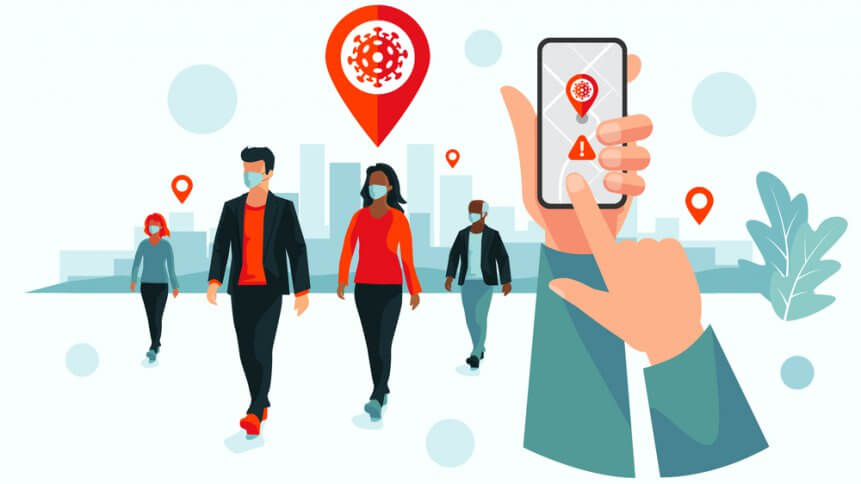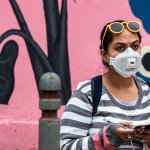Contact tracing – are wearables and card tech the answer?

- Contact tracing apps could help businesses return to workplaces as state-wide solutions face delays
- But these solutions, like nation-wide apps, attract concerns over data privacy and uptake
- Wearable and card technology is emerging as a back-to-basics approach
Globally, nations have been facing varying waves of the COVID-19 pandemic, with some countries currently easing up lockdown measures, while other are still imposing more stringent guidance to control the spread. Alongside self-isolation policies and stay-at-home mandates, contact tracing was known to be a critical factor in preventing the spread of the Ebola virus. Now, contact tracing is once again enlisted to help us combat the latest global pandemic, as people begin to interact once again.
This has triggered a boom of contact tracing apps deployed not just by tech giants, but by private institutions, and government bodies aiming to collect and analyze data vital in the fight against COVID-19.
Even though contact tracing apps are in place to contain the spread of the global pandemic, finding the right balance between the dissemination of public data for the greater good and preserving the privacy of public data is not without difficulty.
A divided Europe in contact-tracing
Europe has been divided by the adoption of contact tracing apps. As Financial Times described, countries like Germany, Italy, Ireland, Austria, and Switzerland are developing their own apps based on available software from tech firms. Meanwhile, the UK, France, and Norway have decided on a more centralized approach that provides health authorities primary control over contact tracing data.
Over the weekend, Germany’s Health Minister Jens Spahn announced that the nation’s smartphone app to trace COVID-19 infections is ready for roll outs, in tandem with easing travel restrictions. The app will alert users when they come into close proximity with individuals at risk of infection. Essentially, the app’s design is based on privacy-focused application programming interface (API) technology developed by tech giants Apple and Google.
Italy has launched its own version of a contact tracing app based on Apple and Google’s model, called Immuni. To date, Immuni has more than 1 million downloads on the Google Play app store, but that’s still a long way from the country’s population total of around 60 million.
As some nations continue to move forward with the deployment of apps, Norway is putting a halt on its national coronavirus contact tracing app. The nation’s data protection authorities have raised an alarm that the software, Smittestopp, is compromising user data privacy as it continuously uploads a user’s locations.
Nations are increasingly facing widespread pressure to deploy a contact tracing app that takes privacy features seriously, are easy to adopt, and that micro-communities, like businesses, can refer to when they develop their own solutions in offices.
Card-based and wearable contact tracing
One of the emerging ideas that fills this gap is card or wearable technology. Businesses are looking towards stand-alone card technology solutions to keep their employees and customers safe while addressing data privacy concerns, and reducing reliance on and power consumption from individuals’ devices – and making enterprise-wide uptake and usage more of a guarantee.
Following this model, businesses would issue a registered contact card unique to their employees. The simple contact card is backed by a contact tracing platform, and proximity data is uploaded securely from cards to an encrypted server, with no actual personal information stored in any of the cards.
In “closed environments” — like food manufacturing factories and fulfillment warehouses — this solution would be ideal as it immediately alarms users of potential risks and is even able to reduce contact tracing time for warnings.
Since employees in close proximity with colleagues who have tested positive for COVID-19 will be immediately notified, they are able to take appropriate measures. Organizations will save the time and resources needed to manually track each contact.
The minimalist idea of a contact tracing card is that it doesn’t rely on the backing of IT infrastructure: There’s no download of a mobile app, no need for an internet connection, and the lack of registration of personal information is seen favorably by those concerned with inputting their details and particulars.
The main elements of card technology is its minimal need to function but the immense capability for enterprise-wide deployment.
Singapore has been at the leading edge of digital contact tracing, having developed its TraceTogether app months ahead of other countries. However, despite a well-publicized campaign, it faced relatively poor uptake, with just one in six citizens downloading it. The city-state, which is often compared to running like a corporation itself, is now considering wearables as a low-cost, but more dependable solution.
On TechHQ, Raja Roy, head of engineering at PK, discussed the need for “privacy-first” and Bluetooth-inspired apps rather than “private geolocation data” used to track interactions. The stated apps require minimal user information and a selected team (such as administrators or HR personnel) to access the database.
Taking into consideration the issues raised regarding apps, stand-alone solutions bear promising signs to assuage concerns.










